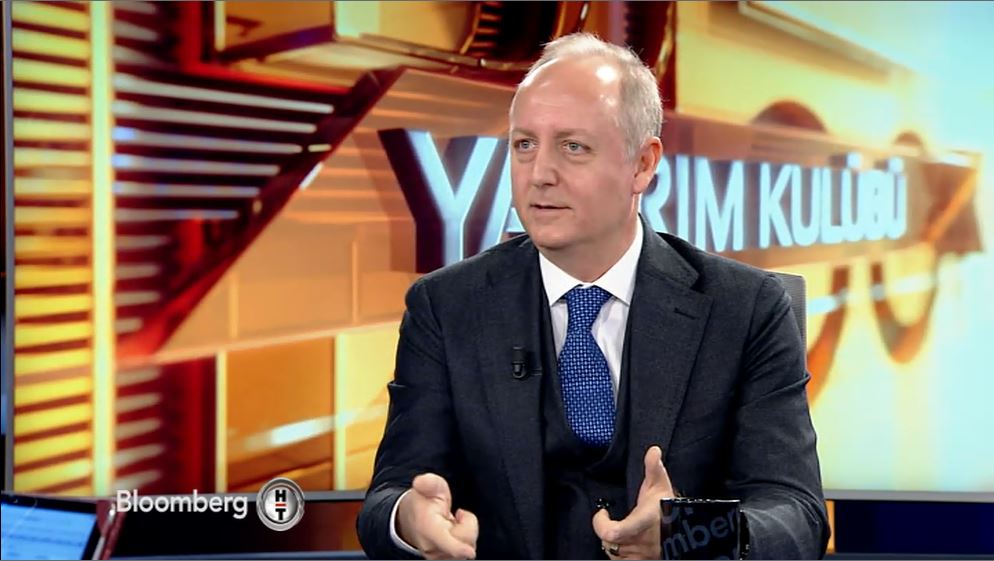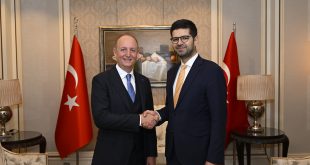Bloomberg HT – Investment Club Program / Açıl Sezen: Welcome to the Investment Club. Today, in our program, we host Mr. Barış Öney, Founder of Globalturk Capital. Welcome, Mr. Öney.
Barış Öney: Thank you.
Bloomberg HT: This week we particularly focus on private equity funds. 2017 was not a bad year in terms of private equity funds. Not only the interest in the new comers or entries were good, but the exits were quiet successful as well. When we look at the upcoming period what shall we expect for 2018? We would also like to discuss about the interest level of FDIs in the market. I’ll also be asking you which areas Turkish companies are seeking foreign partnerships or acquisitions lately. How did we close the year 2017?
Barış Öney: As you mentioned, 2017 started with lots of uncertainties. We went through a referendum process in April. Each year in April EMPEA – as you now EMPEA is the global industry association for PE funds, based in Washington D.C. – makes a survey among its funds, asking them about the countries/regions they are interested in to invest. The survey covers 10 countries/regions and shows the expectation of the funds in these areas. Unfortunately, when they published the survey at their annual meeting in May, we saw that Turkey was ranked at the bottom. But as these funds are operating in long term cycles, we consider Turkey’s ranking as an advantage. We hit the rock bottom so the only way is up from going forward. However, despite this bottom ranking, serious investments were realized in 2017. In the meantime, we witnessed important exits through IPOs. Exits that we can call milestones… Personally I believe that there will be positive reflections of these developments in 2018.
In addition, every year, we organize a global meeting for private equity funds with EMPEA in Istanbul. We organized this year’s event on the 7th of December. The attendance to the meeting far surpassed last year’s attendance. PE funds that provided more than US$ 30 billion of funds to Turkey also attended to the meeting. We went through a great series of discussions. All those developments have been discussed during the panels. These PE funds were able to gain two digit returns with the help of these IPO exits. We also carried out a survey during the event among more than 200 participants. 77% of the PE fund representatives in the event declared that they were planning to invest in Turkey in 2018. This was such a pleasing result. But we must not leave it there, on the contrary we should work more on it. In any event, we closed 2017 very well.
In 2018, there are great expectations for emerging markets as well. In the past 4-5 years, there was not much funding flowing towards emerging markets. Or, we should say it wasn’t flowing as much as in the past. Now we are observing that a new flow of resources to the EMs will take place again.
Bloomberg HT: There is growth there. Lately there is much talk on the growth potential of the emerging markets…
Barış Öney: Exactly. Turkey will surely take its fair share from that. When we look at emerging markets Turkey is ranked in the top five percentile for many of the funds such as IFIs. In fact, for some of the funds, Turkey is among the top two countries that they invest in. When we look at the market, for the past couple of years Turkey went through very problematic situations. I remember mentioning these problems in our previous interview. If we can keep calm and pass through the political uncertainties, Turkey will be able to raise 3 to 4 billion USD of new funds in 2018. Even more…
Bloomberg HT: This is such an important amount, in terms of trust in the Turkish companies and DFIs coming into the market. Do you see the signs of normalization in the market?
Barış Öney: Frankly, I do. At the moment, there is a lot going on in the political agenda of Turkey and of the world. In fact, the global agenda has far surpassed Turkey’s order. Last night there was the United Nations’ voting (on the recognition of Jerusalem as the capital of Israel). This was such an important matter for the world. Developments in North Korea, the referendum in Catalonia in Europe, the ongoing Brexit process in UK were only some of them. Because of our initiatives in the UK, I spend almost half of the month in London and although Brexit process seems to be going smoothly from far, people do talk about it day in and day out. And there is a sense of great uncertainty in the UK. So there are many issues like that all around the world. Therefore, I believe the world will keep on going like this for couple of decades. Americans or Brits or Europeans are not used to living or investing in an environment of uncertainty. They do not have the necessary muscles developed for that. But if we look at the Turkish business community or investors, we are pretty immune for an environment like this. We are a society accustomed to live like this throughout our lives. I believe we’ll calm down sooner than many think but it might be hard for the US and Europe to normalize in the short run. I think we can benefit from it. Our business community is capable of attracting these funds into Turkey. I also believe that after some time, both Turkish and foreign companies will understand that this ambiguity will last much longer and this understanding will push them to take geographical positions. In other words, they’ll divide the risk into different geographies. How will they do it? Via mergers and acquisitions. A British company will merge with or acquire a company in France or in Germany or vice versa. Turkish, Indian, Chinese companies will go and buy companies elsewhere. I believe we’ll witness an enormous increase in the M&A activity. Because it is the state of the world at the moment. And as the business world we’ll live through it.
Bloomberg HT: It seems like there is a chance of a big outbreak here. When I used the term “outbreak”, I mean, in a positive way… Especially global companies hold a big chunk of cash. Their cash positioning is at the highest levels because of the support of their central banks for many years. And these companies are looking for ways to make good use of this cash. So as to gain value from this cash, maybe 2017 had been the first year for the continuing global growth in a combined way. 2018 seems like very similar. That’s why I am asking… Is there a potential for higher entries and growth?
Barış Öney: Absolutely. Turkey is likely to get more interest. Even if these companies and also PE funds make investments all around Europe, they still hold big amount of cash in their pockets. So that money will go somewhere… Investors and the business community do not wait. They’d like to invest and grow their businesses respectively. They will surely work on gaining more profits. When we look at this situation, it shows a potential. And if some of this money will go to the emerging markets, and we sure know that it will, we see China as the collector of the biggest amount of investments. When we look at Europe, Turkey is competing with Poland to attract these investments. Rest of the countries that exists in our region are Ukraine, Russia and Baltic countries, Middle Eastern countries and some countries in North Africa. When you look at the profile, you see that Turkey is more likely to attract most of the investments. What is blocking our way? Political uncertainty and risk. Only this. We do not have any other major problems. This uncertainty may last a while though.
Bloomberg HT: What do you mean by political uncertainty?
Barış Öney: The state of emergency. The faster we get rid of this situation is in the benefit for all. Apart from this, there are legal issues. These are our major two problems. When we see normalization regarding these issues, things will get better. As a person in the business world for so many years, I have to admit that, at the moment, the perception of Turkey in the US and in Europe is not good at all. But despite the sentiments of the investors towards us are negative, we achieved many things in Turkey. The PE funds, and the companies are doing their best. Our companies do invest internationally and locally. Imagine, if we get normalized, what more we can achieve… Actually the investors really would like to come to Turkey. EMPEA and some of the investors are well aware of this.
For the first time in the world, EMPEA appointed a country representative for Turkey. I am their representative. This is very important. This means EMPEA is focusing on a country specially and that we’ve been organizing these conferences for the last 3 years. Imagine TUSİAD is opening a representative office in a country, saying that we’ll focus here. Don’t you think Turkish business community would show interest to that particular country upon TUSİAD’s initiative? They sure do. This is exactly like that. PE funds are observing EMPEA’s interest and look towards Turkey. The investors will understand it more in time. As I said, the problems we are facing are mainly political and legal. Actually when we look at the surveys of EMPEA, we can see these concerns. Why was Turkey ranked as the 10th? Mainly due to the uncertainties in the political front. It signals us that we should overcome these matters to gain confidence of the investment community. In 2016, a record number of funds were raised for Turkey. Back then we ranked in the 4th or 5th place in the EMPEA survey. India ranked in the 10th place back then, but now they are on top. A lot of investments are going to India at the moment. But as I said, these are long term cycles. Turkey’s ranking in the bottom, can be an advantage for us to rise up again. I also believe that we’ll receive good amount of funds.
Bloomberg HT: We had a phone interview. How did you find his opinions on Turkey?
Barış Öney: I agree with the risks he mentioned. We are all aware of them. But the world is now in a very strange position. For example, the relations between Turkey and the US had been problematic in the past as well. Before 1980s, since the Cyprus crises, there had been periods of difficulties. During the Gulf War we had the military crisis of not letting the Turkish soil to the troops. I worked in the DEIK’s Turkish American Business Council as an executive board member for many years. My membership still continues. There had been good and bad times. Actually at the moment, we are going through such a strange period which is hard to understand. As mentioned, White House seems to be making the decision on foreign policy and that America’s foreign affairs are being run on Twitter. It is almost like the U.S. State Department is out of service. We all observing and experiencing these issues. Is US presidency able to tackle domestic matters diligently; what is U.S trying to do abroad? The answers to these questions are not very clear. As a person who lived in the US for many years, I can say that Americans are having great conflicts within their society. Maybe they do not show it to the outer world, but there are serious internal issues. So they have many problems domestically. All countries have their own problems but since the US is very vast and a super power, their problems are big as well. And those problems eventually effect the world. Due to these many matters, we receive our share of these problems in our region. As Alastair said, we do not live in a good geography. Each of our neighbors have layers and layers of problems within themselves, and within their domestic regions. Also those problems are effecting us. Therefore, yes, we do have those risks.
But I don’t think that Turkey is the only country carrying such risks. Yes we have problems but we should also look at the fundamental dynamics of Turkey. Many people in Turkey are asking me: “Why should foreign investors come to Turkey? Why should they trust in Turkey?”
First and foremost, we must differentiate the types of investors. The ones who buys and sells shares from the stock exchange are short term investors. Of course these types of investors are very much effected by the political matters and currency volatilities for instance. Those kind of investors look at the market from a short term perspective. They invest in some of the companies’ shares in waves then get out of the country and go somewhere else. When we look at the PE funds, these funds are being raised for 10 years. The funds are raised from the funds for that amount of time and that money stays in the country for almost 10 years. So when they consider investing in a country for a decade, they look at the fundamentals of that country. And these funds, contrary to the other investors prefer to have local offices in the countries that they consider investing in. They take part in the boards of the companies actively as direct investors. After staying inside for 5, 6 or 7 years, they need to sell their shares and exit. This is an obligation. They are designed to work like this. So their investment decisions are always long term. Of course they are effected by day do day changes in the market, politics etc. but this influence is less.
Bloomberg HT: If we assume that PE funds realize their exits around 5 years, Turkey’s best years were 2012-2013 and the funds who entered the market around that time, lived through difficult times in the past 5 years compared to prior 2012. But despite all, they managed to realize successful exits. They had been here in the most critical times of Turkey. So I believe that 2017 had been an important year. Do you agree?
Barış Öney: Absolutely. I agree. That’s why I expect these fund managers to raise good amount of new funds for 2018 and beyond. Despite all. As you said, they’ve been through all currency shocks. 5 years ago 1 USD was 1,75 TL, today it is 3,85 TL. Despite all, they gained two digit returns. It’s not returns actually; they exited by growing their profits in two digit numbers. So when you show such results to the investors, they understand that the management teams who have been through these difficult times can be far more successful going forward. So they consider investing for another 10 years. So PE funds, apart from other investors, are in the category of direct investors. Usually, these 10 year-funds make investments in the first 3 years, they exit in the last 3 years. When we look at the past, the exits took a long time. Had been 8 or 9 years. But they were still in the period of that 10 years. Of course they prefer to exit in 5 to 6 years but even if they don’t, there is no loss. Surely the faster they exit, the more advantageous they are. If they can exit early, they may start to raise funds for the second decade etc. So, they always look at the potential areas in long term. When you look at the business world between Germany and China, Turkey is the biggest manufacturing base. It has the biggest services sector among the region. It provides variety of services from telecoms to finance. Each ecosystem holds great investment opportunities within itself.
One of the main problems of Turkey is that our companies are small. Our 500th company’s revenue is US$ 80 million. The rest obviously is less than that, very small. We have hundreds of thousands of companies but as they are SMEs the investors can’t get in. How do we attract direct investors? They are coming to these companies. They come via investing or acquiring. There are very few who enter the market via green field investments. Almost none. That’s why the situation of our companies are very important. They should be doing their home works. They must grow in their sectors either by merging or acquiring other players. That is how they can attract foreign direct investors and become global companies.
Bloomberg HT: Are there any specific sectors that come forth in Turkey for the investors? Turkey is mainly a consumer economy. 70% of our economy is based on consuming. Therefore, there were more interest to the companies that operate in this segment in the past. Is it still the same? Or are there companies in the manufacturing area for instance that attract the investors’ interest?
Barış Öney: They are still more interested in the consumer related companies. Because Turkey’s main story is about its young population who are interested in consuming. That’s why, all the sectors that touch consumers are very “in”. Investors can also make their predictions better in these areas. Manufacturing companies usually make corporate sales, sell intermediate products or they sell B2B. In those areas the problem is this: Say that you are selling 80% of your products to top 5 companies. If you lose one of those companies, you also could lose 20% of your revenues. How will you compensate this? Investors look at your business model and decide negatively. But may be this manufacturing company has been working like this for 30 years but it’s hard to break that distrust. The companies should create diversity among their customers. They can go buy a smaller company from the same industry and enhance their customer portfolio. They can also go for mergers. This will also provide great efficiency in their costs. You don’t need two different functions, at least in the general and admin. So this automatically reduces your costs. Your value raises and it gives you an opportunity to attract investors. Companies should consider moving in this direction. Turkish business community must grow by M&As locally and globally. This will attract more international investors to the Turkish market. If the Turkish market adopts this growth model, we’ll attract more and more investments. There are many companies to buy in Europe at the moment. Turkish companies usually say “there is no capital.” But surely there is. There are PE funds. There is money, there are resources. There are great experts who can give advice and guidance as well. We should be benefiting from those opportunities. It will be great for both Turkish businesses and for the country.
Bloomberg HT: We came to the end of our interview but a final question. How do an investor evaluate a company that can manage the currency compared to another one with currency deficit in terms of premium payments? We generally have this foreign exchange problem. No matter how a company is successful operationally, if PE funds see a currency risk at the end of the day, how do they approach the matter?
Barış Öney: It is very important. When the currency rises, the return of investment decreases. But it’s important to manage this risk. As you said, Turkish companies are really strong in terms of operations. Our weakest point is financial management. Generally when we look at the Turkish companies, we see a weakness in their cash flow management. Finance departments are so much focused on tax reporting, collections and the like. They do not have sufficient human resources. Many of them seefinance human resources as costs. But actually, a good financial management brings profits and they may help you attract investors. So it is essential to have good managers in these areas. Also when PE funds evaluate companies for investment even if they see good operational results, export revenues etc., they would say, “let’s appoint here a good financial manager so as to get accurate and transparent reports and manage our cash wisely.” That is one of the first things they do, when they invest in a company.
Bloomberg HT: Thank you very much Mr. Öney.
Barış Öney: Thank you.
 Barış Öney
Barış Öney






